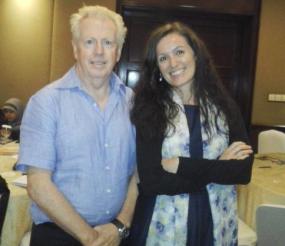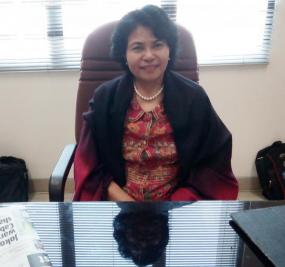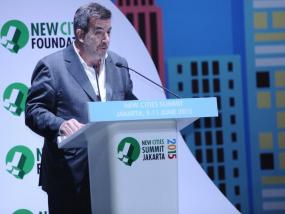Strategic Review Forum: “Pluralism and Progress: Indonesia’s Hope,” Jan 16, 2013, Four Seasons Hotel, Jakarta.
“Since Shia is a minority, it must be the enemy of the majority. This is false thinking.” Exclusive interview with Jalaluddin Rakhmat
Jalaluddin Rakhmat is a well-known Shiite Islamic scholar and lecturer at Paramadina University and at Universitas Padjadjaran in Bandung.
Strategic Review: Is intolerance on the rise, even though Indonesia is known as a moderate country?
Jalaluddin Rakhmat: I was once interviewed by an association of world religious leaders in Basel [Switzerland] and they asked me the same question. Why is violence on the rise in Indonesia when it is known as a tolerant country? My answer is still the same: it’s due to political reasons.
Any transition to democracy is usually characterized by violence. What some people have in mind is only power, how to divide people, how to sell their ideas. Religion is now a kind of commodity, quite sellable, quite marketable. For example, in Sampang [Madura}, everything ends up in terms of religion. They say that as Sunni leaders we should not permit any Shia to live in our neighborhood.
They do this for political reasons. It is a political fallacy. They think that since the Shia are a minority, and we as leaders are voted by the majority, we should side with the majority. Since Shia is a minority, it must be the enemy of the majority. I think this is false thinking, because the silent majority is against any violence.
SR: Why is it so difficult for the government to tackle intolerance?
Jalaluddin: Indonesia as a state is weak. The regime actually doesn’t have concentrated power.
I would like to give an example: the case of the Yasmin Church [in Bogor]. The Supreme Court has given a verdict that Yasmin is okay and it can keep building. But the decision of the highest institution of the law can simply be vetoed at the lowest level of power. For instance, the district annuls the decision of the Supreme Court and there is no reaction at all from the Court. They should at least be insulted, but no. Everything is okay.
SR: Because they are afraid of losing popularity?
Jalaluddin: Yes, probably. I don’t know. But today the State is quite powerless. As the holder of sovereignty, the [decisions of the] State can be easily overturned by the lowest institutions. We have so many “presidents,” to put it simply. We have so many rulers in this country.
SR: As you have experienced yourself, the groups that have been attacked the most are the minorities, like Shia and Ahmadiyah. What is the best way tackle this?
Jalaluddin: Coming back to my idea, we should strengthen the State; people should abide by the law. The DPR could pass a law that supports freedom of religion; it could also ratify international law within this country. They have even done that with UN agreements and we actually support freedom of religion in our Constitution, but there have been inconsistencies all along. Why? Because law enforcement is weak.
SR: In terms of Pancasila, don’t you think part of it, i.e. the first precept, “Belief in One God,” enforces faith?
Jalaluddin: I think there are some benefits and some disadvantages to Pancasila as an ideology. The benefit is that it is an open [ended] ideology. It can be interpreted in different ways. And in that way Pancasila can unite different groups, because it is an abstraction. Ideologies should be that way. But the disadvantage comes from this same idea, since it is very much a matter of interpretation and everyone can interpret it differently. The radicals would say that “Ketuhanan Yang Maha Esa” [Belief in One God] means to focus on Maha Esa, the one and only God. This only tolerates monotheism and so Pancasila would exclude polytheism. Monotheism could be interpreted as the group ideology.
So rather than being a uniting ideology, Pancasila can be a dividing one because of interpretation… We should have a legally recognized interpretation of Pancasila. Only in that way could we measure laws and regulations based on Pancasila.
SR: What do you think of this issue in terms of the 2014 election?
Jalaluddin: One example was the election for the Mayor of Sampang, which was very political. Many Sampang people belong to the PPP and when the Minister of Religion visited Sampang, he sided with his constituents. If I am not mistaken he is the chairperson of PPP.
It was in this context that he said Shia is a misleading group, and is not part of Islam. It is not good for a Minister of Religion to judge a certain group as not belonging to Islam. Of course his support for the anti-Shia movement incited violence in that area after the minister supported the fatwa of the local Council of Ulemas. At that time, the local Council of Ulemas felt strongly supported by the government, so they did what they did.
In the general election of 2014, it would be necessary to consider this kind of extremism. Some would say that since Sunni is the majority, we are supporting the majority by being against Shia. It’s a false idea, of course. Because the silent majority is against any violence, but politicians do not know the silent majority. What they hear is, “if you are against Shia, then you will be supported by the majority.” Most politicians are really for religious violence, except PDI-P, perhaps, because PDI-P is quite secular.
If you are quite secular then you will readily accept Shia or any religion, even if you worship frogs. It is a matter of belief. We are not concerned with what people believe, we are concerned what people are like.
SR: In your career and your teachings, what have you done to combat intolerance?
Jalaluddin: First of all I set up an educational institution based on the very pluralism that I am advocating. My wife has established about 18 schools [16 of them free]. In this way we can support lots of schools all over Indonesia and we teach them pluralism. Secondly, we also practice it ourselves. For instance I have established an organization called Badan Koordinasi Perjuangan Kebebasan Beragama dan Kepercayaan (BPKBB) consisting of Christians, Catholics, Hindus, Buddhists, even Baha’I and Ahmadis. Third, we also have worked together with different religions and faiths for social charity, like helping people in natural disasters. And we ask our people to work with different religions all over Indonesia. We always oblige them to work with different religions. In this way they put pluralism into practice without too much talking.










%20resized.png)
